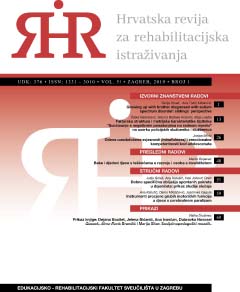GROWING UP WITH A BROTHER DIAGNOSED WITH AUTISM SPECTRUM DISORDER: THE SIBLINGS’ PERSPECTIVE
GROWING UP WITH A BROTHER DIAGNOSED WITH AUTISM SPECTRUM DISORDER: THE SIBLINGS’ PERSPECTIVE
Author(s): Silvija Hinek, Ana Tokić MilakovićSubject(s): Education, Health and medicine and law
Published by: Sveučilište u Zagrebu, Edukacijsko-rehabilitacijski fakultet
Keywords: siblings; autism spectrum disorder; support; qualitative study;
Summary/Abstract: The relationship between siblings is often the longest lasting relationship within an individual’s life (Cicirelli, 1995). This relationship is especially important for individuals with developmental difficulties, since their siblings are usually those who undertake the role of caregivers, after the parents are no longer available to do so. However, recent research suggests that establishing a close relationship with a sibling diagnosed with autism spectrum disorder (ASD) may be considerably more challenging compared to siblings with other developmental difficulties (Tomeny et al., 2017). Although the siblings of individuals diagnosed with ASD have received a certain amount of attention in the last decade worldwide, this area is still under-researched in Croatia, and is insufficiently addressed in interventions aimed at helping families with children diagnosed with ASD. The aim of this study was to explore the experiences of siblings living with a brother with ASD and their perceptions of the received and needed support. Six semi-structured interviews with adult siblings of individuals with ASD were conducted and analysed using thematic analysis. Generally, most of the interviewed individuals show a relatively high level of acceptance and affection towards their brother and feel that they have adapted to the brother s condition. Although they mentioned some positive experiences and outcomes, they reported on many difficult aspects ofgrowing up with their brother on the autism spectrum. None of them received any professional support during their growing up, and their opinions about the potential usefulness of programs targeted at siblings are divided.
Journal: Hrvatska revija za rehabilitacijska istraživanja
- Issue Year: 55/2019
- Issue No: 1
- Page Range: 1-12
- Page Count: 12
- Language: English

